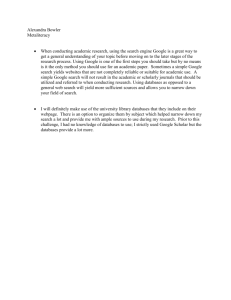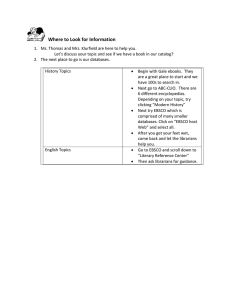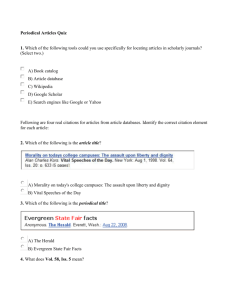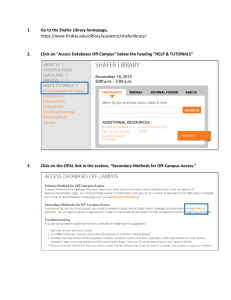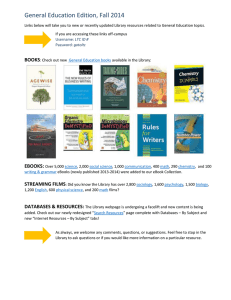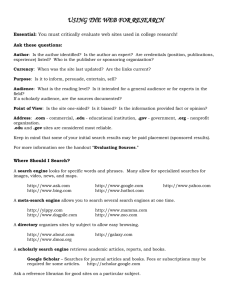Native Issues-CATC: Research Strategies
advertisement
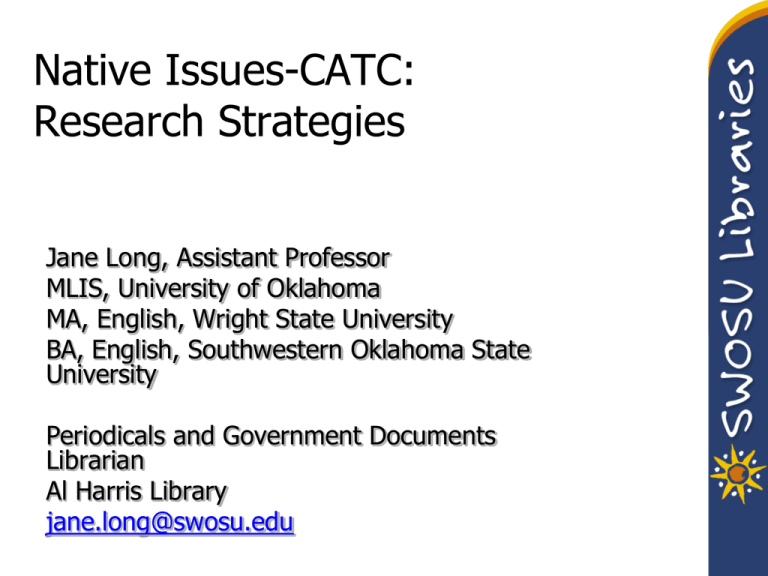
Native Issues-CATC: Research Strategies Jane Long, Assistant Professor MLIS, University of Oklahoma MA, English, Wright State University BA, English, Southwestern Oklahoma State University Periodicals and Government Documents Librarian Al Harris Library jane.long@swosu.edu Outline of session • Plan your search/Keywords/Boolean • Choosing appropriate Sources/Databases • Work with using Citations • Visit the library Major Concerns • Topic Selection • Narrowing the search • Using the library effectively What is your research question? “What is the Trail of Broken Treaties and how does this connect with the American Indian Movement?” Answering this question will be the focus of your research. Using keywords and keyword phrases will lead you to information about the question. Identifying Keywords • Identify the significant terms and concepts that describe your topic. – Use your research question for guidance. – Formulate your thesis statement by considering your question. • Use these keywords for searching catalogs, databases and search engines for information about your subject. Boolean • AND = Narrow • OR = Expand • NOT = Exclude Books • • • • Al Harris Catalog Ebrary Ebooks on EBSCO Open World Cat Ebrary: eBooks • • • • • • 24/7 Full Text Searching* Highlight Markup Note Taking Changeable Font Size Multiplicity of Use • CREATE A BOOKSHELF eBooks on EBSCO • • • • • 24/7 Full Text Searching Highlight Markup Note Taking Changeable Font Size • Create a FOLDER Open World Cat • Meta search engine for online catalogs of libraries all over the world. Search for any book using a geographic location for the closest sources. • Over 9000 libraries combined. • If you find it in WorldCat, and it's not in our library, we can get it through ILL. • CREATE A USER ACCOUNT Choose Appropriate Databases • Begin with Library Resources for your Subject • Search several databases • Think about the range of sources: books, journal articles, statistics, websites • Remember: Google is not (usually) the answer Databases: Social Sciences • • • • • America: History and Life with Full Text JSTOR North American Indian Thought & Culture Project Muse Also video resources such as Films on Demand or VAST: American History on Video EBSCO Databases • America: History and Life with Full Text JSTOR • Includes archives of over one thousand leading academic journals across the humanities, social sciences, and sciences. • Search by discipline: History Project Muse • Peer-reviewed journals • Wide variety of humanities and social science subjects • Complete journal content, including charts, graphs, and images North American Indian Thought & Culture • • The collection is comprised of material that covers the entire history of North America; from 17th century accounts of the first encounters involving Indians and European colonists to the stories of aboriginals living in a 21st century world. This is a good source for locating basic or background information. Reading citations A citation is a short, multi-part description of a specific information source. It provides the information that is needed to find that source. Citations: • Giving Credit to Sources • Using Citations to locate additional sources – Areas to document: • Books • Periodicals: – Journal – Magazine – Newspaper • Conference Reports • Websites A standard journal citation will include: Author Title of the article Title of the journal Volume number/Issue number Publication date Page numbers A standard book citation will include: • Author • Title • Publication information – City – Publishing Company – Date A standard website citation will include: • • • • • • Author – if given Title of content used Title of webpage Name of organizational sponsor Publication date Date of access Google: Improve Your Searches Site Specific Command What it does: searches only specific domains What to type: Trail of Broken Treaties site:edu Trail of Broken Treaties site:gov Google Scholar • Google Scholar provides a simple way to search for scholarly literature. Search across many disciplines and sources: peer-reviewed papers, theses, books, abstracts and articles, from academic publishers, professional societies, preprint repositories, universities and other scholarly organizations. Google Scholar • Works best for Citations • Restrictions to Content – Fee-based – Often your library already owns material – We’re working on improving access Native Issues: Internet Resources • Tribal Government and Native American Resources • Native American Documents Project • Indian Affairs Laws & Treaties Review • Searching techniques • Books: – Ebooks/Catalog/Open WorldCat • Databases: – America: History and Life with Full Text/JSTOR/North American Indian Thought & Culture/Project Muse • Google Site Search/Scholar Helpful Things to Remember As You Complete Your Research Assignment: • Read carefully, make notes, and take advantage of the resources that are available to you. • Do not parrot the material: use your own words and your own style as you write. • Use what you have learned about your topic to develop your own analysis of the subject. In this way, you are answering your research question. Questions? • Contact me: – Jane Long • 774-3731 • jane.long@swosu.edu
